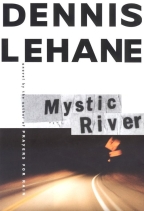Mystic River
Dennis Lehane
William Morrow / Harper Collins
US Hardcover First
ISBN 0-688-16316-5
Publication Date: 01-30-2001
401 Pages; $25.00
Date Reviewed: July 10, 2003
Reviewed by: Terry D'Auray © 2003

REFERENCES
COLUMNS
|
|
|
Mystic RiverDennis LehaneWilliam Morrow / Harper CollinsUS Hardcover FirstISBN 0-688-16316-5Publication Date: 01-30-2001401 Pages; $25.00Date Reviewed: July 10, 2003Reviewed by: Terry D'Auray © 2003 |
|
|
REFERENCES |
COLUMNS |
There's reason to worry when a top-rated writer of series mysteries tries his hand at a stand-alone. The first concern, always at the top of my mind, is that he'll abandon the series and I'll never again get to read another book with characters I've grown to know and care about over the years. It's a reading investment brought to an abrupt and unwanted end, enough to make anyone a little pissy. In the case of Dennis Lehane, that's a real concern, equivalent to the loss of at least one book each year that's certified solid gold. The other concern, of course, is that the stand-alone will be a dog. It's happened with some of the best - Michael Connelly's 'Bloodwork' and Bill Pronzini's 'In an Evil Time' spring to mind.
Dennis Lehane wrote the highly lauded five-book Patrick Gennaro/Angie McKenzie series about a male/female detective pair set in Boston. With that series, Lehane wrested ownership of Boston-based detectives from Robert B. Parker, and ratcheted the standards up, way up. While solidly in the Chandler/Parker vein, Lehane's books are contemporary, tough and meaty, characteristic of the best hypermodern detective writers.
'Mystic River' is the story of three boys from a working class neighborhood in Boston who play together as kids, mature and go their separate ways, and are reunited some twenty-five years later in the aftermath of a brutal murder. Sean Devine, whose father is a foreman at a nearby factory, is from the Point. Nicer -- meaning wealthier -- kids come from the Point. Sean goes to a school that makes him wear a uniform, and is a pretty average, buttoned-down eleven-year old boy. Jimmy Marcus is from the Flats, a seedier, tougher but still blue-collar neighborhood. He's a smart, fearless, trouble-seeking wild child with an alcoholic father. Dave Boyle, abandoned by his father and living with his mentally ill mother is also from the Flats. He's the doofus tag-along of the trio, a little slow, a little late to catch on, yearning to be liked and trying far too hard to fit in. One Saturday while playing in the street, the boys are accosted by two men who try to lure them into a van. Sean and Jimmy, both quick witted enough to smell trouble, resist. Dave does not. Four days later, Dave is returned to his home by the police, now quieter, more disconnected, even more of an outcast. His ordeal is never discussed. Sean feels guilty that he did nothing to help Dave while Jimmy pays the whole incident no mind.
Fast-forward twenty-five years, to the brutal murder of a young girl in a park near Mystic River. The boys have grown up, married, and fathered children, each following a different path. Sean is now a cop, Jimmy the owner of the corner store, with a prison record, and Dave is a dockworker. The murdered girl is Jimmy's daughter, the cop assigned to the case is Sean, and the prime murder suspect is Dave.
Lehane tells a dense, dimensioned story that spans decades, lives and multiple connections, connections made, lost and rekindled. We ultimately learn the details of Dave's abduction and who killed Jimmy's daughter. But that's not the soul of this book. We share the reality of each boy-turned-man's life, his loves, his escapades, his guilts, his fears, each told with insight and depth. That's the soul of the book, the source of its richness, and it's meted out in careful measure, gem by gem. Lehane paces his novel perfectly, not so fast as to make it a bang, bang checklist of plot points, but not so slowly as to lose suspense or the reader's involvement.
Lehane, more than others writing this genre, can describe both the outsides and the insides of his characters, and it's the insides that make them real, fully human, and fully engrossing. Lehane writes dialogue convincingly, he writes exposition with clarity and purpose. His writing is simple, clean, spare and powerfully intense. There's only moderate foul language, and limited violence, which comes as a bit of a surprise (and, I'd guess, a bit of a disappointment) to his series readers. This is a genre-blurring book, part murder mystery, part police procedural, part saga, part social set piece, all wholly engaging.
I approached 'Mystic River' with trepidation, fearing it would disappoint, but this was certainly not the outcome. In fact, forced to choose one 'Mystic River' over more Kenzie/Gennaro books, I'd have a tough call. Lehane writes literature informed by mystery as well as he writes mystery informed by literature. In either case, the result is truly not to be missed.